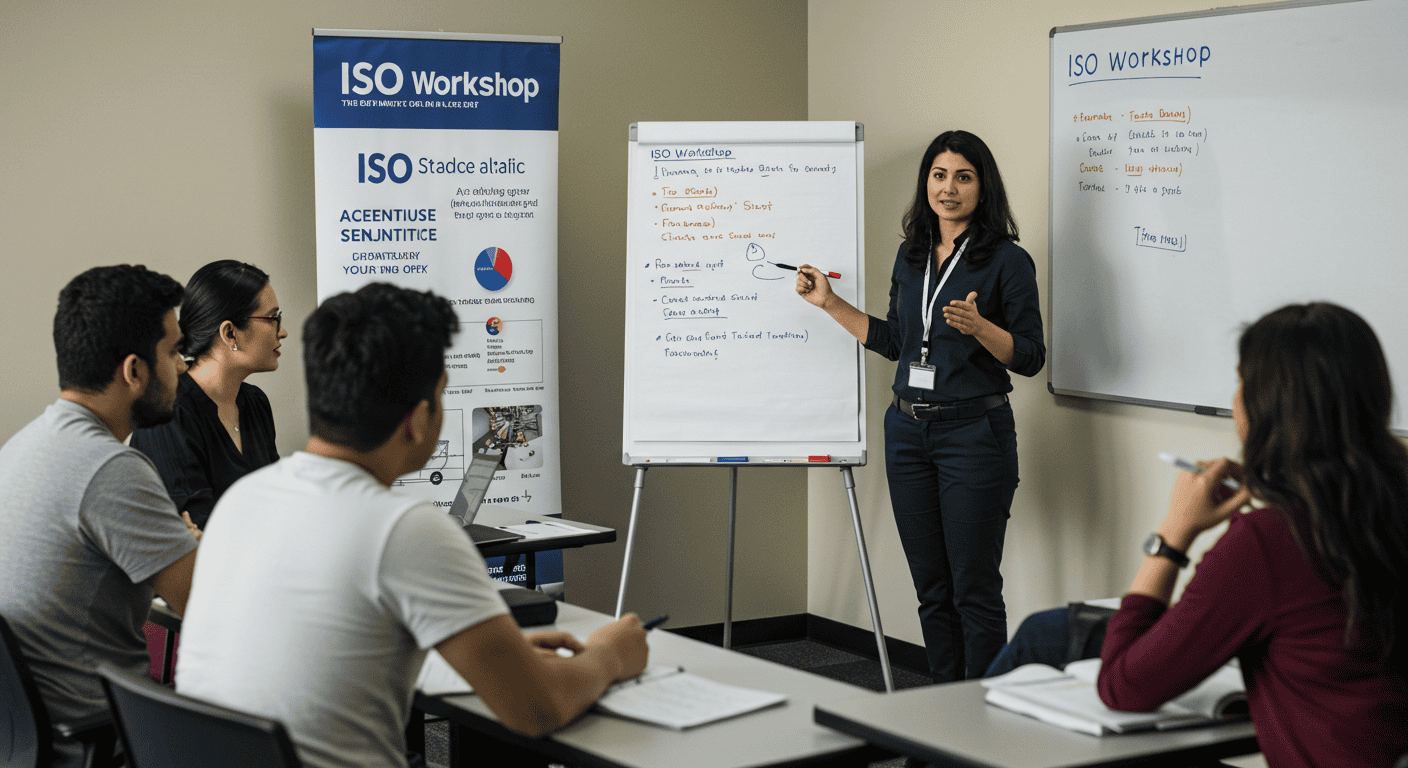ISO training in Malaysia focuses on developing competency in implementing and maintaining various International Organization for Standardization (ISO) management systems. These training programs are designed to meet the requirements of Standards Malaysia (Department of Standards Malaysia) and international certification bodies, helping organizations achieve and maintain ISO certifications.
The training encompasses various ISO standards commonly adopted in Malaysia, including ISO 9001 (Quality Management), ISO 14001 (Environmental Management), ISO 45001 (Occupational Health and Safety), and other industry-specific standards. Programs are tailored to address local regulatory requirements while maintaining international compliance.
ISO Training Malaysia
Who Should Attend ISO Training?
Management representatives, quality managers, internal auditors, consultants, and professionals responsible for implementing and maintaining management systems should attend ISO training. This includes personnel from various industries seeking to implement or improve their ISO management systems.
Department heads, process owners, and staff involved in quality, environmental, or safety management systems also benefit from ISO training to ensure effective implementation and maintenance of standards within their organizations.
What Are The Key ISO Standards Covered?
Training programs cover popular ISO standards in Malaysia, including ISO 9001:2015 (Quality Management Systems), ISO 14001:2015 (Environmental Management Systems), ISO 45001:2018 (Occupational Health and Safety Management Systems), and ISO/IEC 27001 (Information Security Management Systems).
Based on sector requirements, industry-specific standards such as ISO 22000 (Food Safety), ISO 13485 (Medical Devices), and IATF 16949 (Automotive Quality Management) are also covered.
How Is Training Structured And Delivered?
Training is typically delivered through classroom sessions, workshops, and practical exercises. Programs are structured in modules covering awareness, implementation, internal auditing, and lead auditor courses for various ISO standards.
Training providers offer public and in-house training options, ranging from one-day awareness programs to comprehensive five-day lead auditor certifications.
What Are The Implementation Skills Developed?
Participants learn practical skills for implementing ISO management systems, including process mapping, documentation requirements, risk assessment, and performance measurement. Training covers the development of management system documentation, procedures, and work instructions.
Special emphasis is placed on understanding and applying the Plan-Do-Check-Act (PDCA) cycle and risk-based thinking in management system implementation.
How Does Training Address Audit Requirements?
Internal auditor training programs develop competencies in planning, conducting, and reporting management system audits. Participants learn audit techniques, nonconformity identification, and corrective action processes according to ISO 19011 guidelines.
Lead auditor courses provide comprehensive training for those seeking to conduct third-party audits or lead internal audit programs within their organizations.
What Are The Certification Options Available?
Various certification programs are available through accredited training providers, including internal auditor certifications, lead auditor certifications, and implementation specialist qualifications. These certifications are recognized by international certification bodies operating in Malaysia.
Professional certifications are typically valid for three years and require continuous professional development to maintain certification status.
How Does Training Support Organizational Improvement?
Training focuses on developing skills for using ISO management systems as tools for organizational improvement. Participants learn to identify opportunities for improvement, implement effective controls, and measure system performance.
Programs emphasize the integration of management system requirements with business processes to achieve operational excellence and sustainable improvement.
What Are The Latest Standards Updates Covered?
Training content is regularly updated to reflect the latest ISO standards and versions of interpretation guidelines. This includes coverage of new requirements, changes in implementation approaches, and emerging best practices.
Special attention is given to transition requirements when standards are updated, helping organizations understand and implement necessary changes to maintain certification.
How Is Industry-Specific Application Addressed?
Training programs include industry-specific modules and case studies relevant to different sectors in Malaysia. This helps participants understand how ISO requirements are applied in their specific industry context.
Examples and exercises are tailored to address common challenges and requirements faced by different industries in implementing and maintaining ISO management systems.
What Are The Documentation Requirements Covered?
Training covers the development and management of documented information required by ISO standards. Participants learn about mandatory documentation requirements, document control procedures, and record management systems.
Special focus is developing simplified yet effective documentation systems that meet ISO requirements while supporting operational efficiency.
How Is Risk Management Integrated?
Participants learn to apply risk-based thinking in management system implementation and maintenance. Training covers risk assessment methodologies, treatment options, and monitoring of risk management effectiveness.
Programs emphasize integrating risk management principles across different ISO systems to support effective decision-making and process improvement.
What Support Is Provided Post-Training?
Training providers typically offer post-training support, including consultation services, refresher courses, and access to updated reference materials. This ensures participants can effectively apply what they have learned in their organizations.
Some providers maintain alumni networks and discussion forums where participants can share experiences and best practices in ISO implementation and maintenance.

